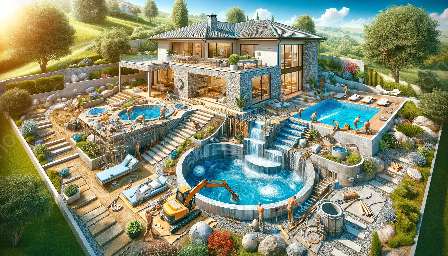When it comes to creating a relaxing and rejuvenating environment, spas and swimming pools rely on water filtration systems to maintain the highest standards of cleanliness and hygiene. Proper filtration is essential for ensuring that spa-goers can enjoy a safe and enjoyable experience, free from harmful contaminants and impurities. In the context of spa construction and the broader domain of swimming pools & spas, water filtration takes on an even greater significance, influencing not only the water quality but also the overall success and appeal of these recreational facilities.
The Importance of Water Filtration Systems for Spas
Water filtration systems play a crucial role in maintaining the purity and clarity of the water in spas. These systems are designed to remove impurities, debris, and contaminants from the water, ensuring that it remains clean, safe, and visually appealing. By employing effective filtration technologies, spas can create a pristine and inviting environment that promotes relaxation and well-being.
Furthermore, in spa construction projects, the installation of advanced water filtration systems is a fundamental consideration. Architects, engineers, and designers must carefully integrate these systems into the overall spa infrastructure to guarantee optimal functionality and performance.
Enhancing Hygiene and Safety
Water quality is essential for the health and safety of spa patrons. Filtration systems help in eliminating bacteria, viruses, and other microorganisms that could pose a risk to the well-being of individuals using the spa facilities. Additionally, these systems aid in the removal of organic matter, such as skin cells and body oils, which can contribute to the formation of harmful by-products through chemical reactions. By safeguarding the water quality, filtration systems play a vital role in maintaining high standards of hygiene and safety in spas.
Advanced Technologies for Water Filtration
The field of water filtration has seen significant advancements, with innovative technologies emerging to address the evolving needs of the spa industry. From traditional sand and diatomaceous earth filters to modern UV sterilization and ozone-based purification systems, spa operators have a wide array of options to choose from when it comes to water filtration. Each technology offers unique benefits and features, allowing spas to tailor their filtration systems to suit specific requirements and preferences.
Integration with Spa Construction and Design
Effective water filtration is an integral part of the overall design and construction of spas. Architects and builders must collaborate closely to ensure that the filtration systems are seamlessly integrated into the facility, aligning with aesthetic, functional, and regulatory considerations. The selection of filtration equipment, placement of filtration components, and the incorporation of maintenance access points are vital aspects that require careful attention during the design and construction stages.
Furthermore, considering the broader context of swimming pools & spas, water filtration systems have a significant impact on the operational efficiency and long-term sustainability of these facilities. Well-designed filtration systems contribute to energy savings, reduced water consumption, and extended equipment lifespan, making them a valuable investment for both new and existing swimming pool and spa complexes.
Conclusion
Water filtration systems are indispensable for the successful operation and maintenance of spas. By utilizing advanced filtration technologies and integrating them seamlessly into spa construction projects, operators can ensure that their facilities offer a clean, safe, and enjoyable experience for their clientele. Whether it's eliminating impurities, enhancing water clarity, or promoting hygiene, water filtration systems play a vital role in shaping the overall appeal and functionality of spas and swimming pools, contributing to their long-term sustainability and success.


